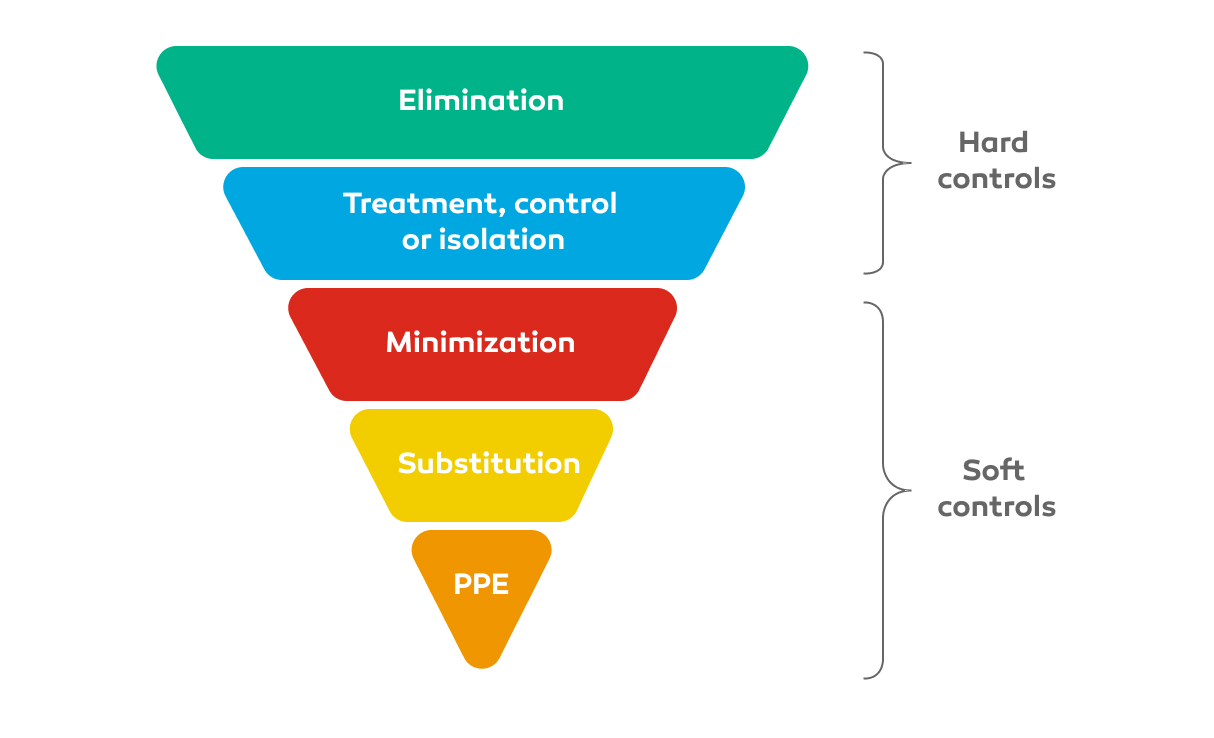


We focus on ensuring that work environments are free of agents that have an impact on the physical or mental well-being of our workers. Therefore, we apply a procedure to identify hazards, assess risks and determine controls, in order to intervene and prevent occupational injuries or diseases in our workers.
Under this line, we have the procedure PROA1-043 Hazard Identification, Risk Assessment and Determination of Controls, which is part of our CASS Corporate Management Model. The Technical Committee of the Corporate Management Model is responsible for the revision of the document, and the Corporate Management Administration, in charge of the indicated model, is responsible for preparing, approving and controlling ¾after its approval¾ the distribution of the procedure in all our offices.
This procedure is applied in all our sites, products, processes and services, and considers routine (normal) and non-routine (non-normal) conditions, as well as activities carried out under emergency situations by our staff and all people who have access to the workplace (suppliers, contractors, subcontractors, customers and visitors).
In addition, this procedure considers the associated hazards and risks that originate in the workplace environment and that may adversely affect the safety and health of people under the control of our company.
As for the development of the procedure, it integrates five stages:

We train our human talent in safety and health through the Hazard Identification, Risk Assessment and Control (IPERC) course to improve their ability to identify risks. Likewise, we apply the Stop Workprocedure, which allows our workers to inform their immediate manager about a situation that poses a danger to their life, which causes the immediate cessation of the activity they were carrying out.
It should be noted that, annually, we evaluate the performance of occupational health and safety management to implement improvements.
However, despite our concern to invest in safety and health training for our workers, the following occupational accidents were reported during 2022:
| Accidents | Accidents | Quantity 2021 | Quantity 2022 |
|---|---|---|---|
| Own | Minor | 1 | 2 |
| Serious | 5 | 18 | |
| Fatal | 0 | 0 | |
| Contractors | Minor | 22 | 16 |
| Serious | 19 | 13 | |
| Fatal | 0 | 2 | |
| Total | 47 | 51 | |
Source: Safety Department Management.
In the case of reported accidents, to comply in a timely manner and ensure adequate reporting internally and to different authorities, we apply our Incident, Hazardous Incident, Accident and Emergency Management mechanism.
In addition, we implement good preventive and corrective practices, and we have a frequency and safety index that allows us to monitor the culture of prevention in our company.
| Indicator | 2021 | 2022 |
|---|---|---|
| Accident Frequency Index (IFAT – in Spanish)* | 1.61 | 1.85 |
| Accident Severity Index (ISAT – in Spanish)* | 23.67 | 451.57 |
*El cálculo se ha realizado con base en 1,000,000 horas trabajadas.
*The calculation has been made based on 1,000,000 hours worked.
Source: Safety Department Management.
In 2022, the rate of injuries due to a recordable occupational accident or corporate Occupational Accident Frequency Index (IFAT) for own personnel and contractors is 1.85, including serious and minor accidents; and the corporate Severity Index (ISAT) is 451.57, both indicators include women and men.
During 2022, the following injuries or accidents were identified in our internal staff and contractors.
| Nature of the injury | Number | Percentage (%) |
|---|---|---|
| Impact | 21 | 48.8% |
| Contusion | 7 | 16.3% |
| Cut | 5 | 11.6% |
| Amputation | 2 | 4.7% |
| Contracture | 2 | 4.7% |
| Sprain | 1 | 2.3% |
| Bone Fracture | 1 | 2.3% |
| Wound | 1 | 2.3% |
| Irritation | 1 | 2.3% |
| Burn | 1 | 2.3% |
| Tendonitis | 1 | 2.3% |
| Total | 43 | 100% |
Source: Safety Department Management
Below are the main indicators on health and safety in workers and contractors.
| Indicator | 2021*** | 2022 | |||||
|---|---|---|---|---|---|---|---|
| Workers | Contractors | Workers | Contractors | ||||
| Men | Women | Men | Women | ||||
| Number of deaths resulting from an occupational accident injury | 0 | 0 | 0 | 0 | 2 | 0 | |
| Rate of Deaths Resulting from Work Injury | 0 | 0 | – | – | – | – | |
| Number of work-related injuries with major consequences (not including fatalities) | 1 | 23 | 16 | 2 | 13 | 0 | |
| Workplace Accident Injury Rate with Major Consequences (Not Including Deaths) | 0.93 | 0.76 | – | – | – | – | |
| Number of Recordable Workplace Accident Injuries | 6 | 41 | 2 | 0 | 16 | 0 | |
| Recordable Workplace Accident Injury Rate | 1.11 | 1.68 | 3.48 | 1.42 | |||
| Number of hours worked | 5,386,301.60 | 23,806,163.63 | 5,754,666.0 | 21,884,387 | |||
** El cálculo se ha realizado con base en 1,000,000 horas trabajadas. Para la recopilación de datos, las Jefaturas de ** The calculation has been made based on 1’000,000 hours worked. For the collection of data, the Safety Headquarters of each of the operations deliver monthly, to the Management of the Safety Department, a record of information of the accidents that occurred: minor, serious and fatal, broken down by own personnel and contractors, which is consolidated for corporate reports.
*** 2021: Accident record is made for own personnel and contractors, gender is not specified.
Source: Safety Department Management.
| 2019 | 2020 | 2021 | 2022 | |
|---|---|---|---|---|
| Lost Time Injury Frequency Rate (LTIFR) – Employees | – | – | 0.93 | 3.13 |
| Lost Time Injury Frequency Rate (LTIFR) – Contractors (includes fatal) | – | – | 0.76 | 0.59 |
| Total Recordable Injury Frequency Rate (TRIFR) – Employees | – | – | 1.11 | 3.48 |